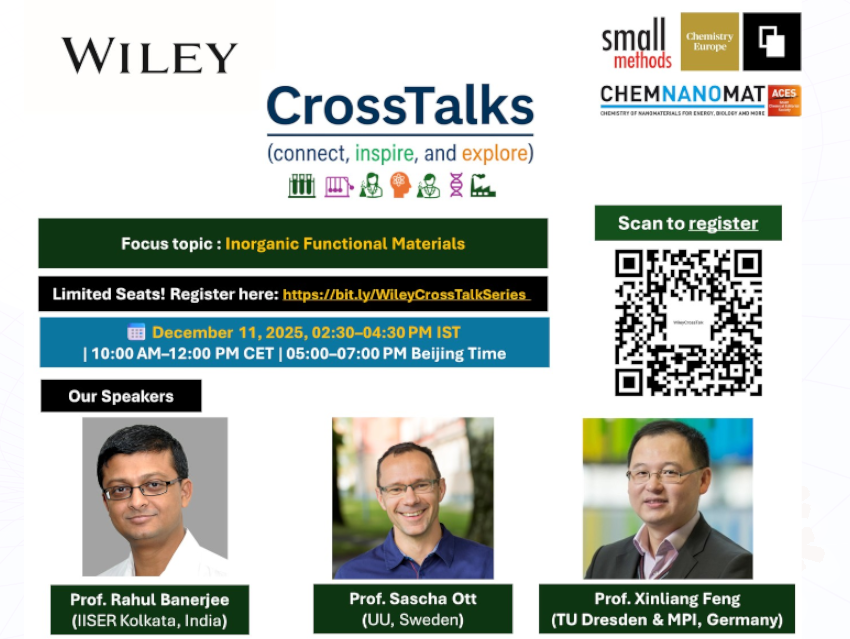CrossTalks! (connect, inspire, and explore) is an editor-driven, newly launched webinar series, powered by Wiley, that brings together experts and curious minds to share insights, spark ideas, and explore new frontiers in science.
This session is presented in association with the journals Small Methods, ChemistryEurope, and ChemNanoMat.
Speakers
- Prof. Sascha Ott Uppsala University, Sweden
Title: Charge Transport in Redox-conducting Metal-organic
Prof. Sascha Ott studied chemistry as an undergraduate in Germany and Australia, and obtained his PhD in Chemistry at University College London, U.K., in 2002. Following postdoctoral work with Profs. Björn Åkermark and Licheng Sun at Stockholm University, Sweden, he moved to Uppsala University in 2004, and became Professor in Synthetic Molecular Chemistry at the Department of Chemistry – Ångström Laboratory in 2017. Research in the group is centered on different topics at the interface of organic chemistry and molecular inorganic chemistry. These include works on low-coordinate and low-valent phosphorus in an organic chemistry context, and the development of molecular redox catalysts of energy relevance, more recently in the confinements of MOFs. Over the last five years, redox-conducting MOFs have been the center of focus in the group.
- Prof. Rahul Banerjee IISER Kolkata India
Title: Reticular Chemistry: From Covalent Organic Frameworks to Porous Crystalline Nitrogen Doped Graphite
Prof. Rahul Banerjee received his PhD degree from the University of Hyderabad, in 2006. After a postdoctoral work at UCLA (2006-2008), he joined CSIR-National Chemical Laboratory, Pune, India, in 2008 as a Scientist. Prof. Rahul Banerjee is currently a Professor at the Indian Institute of Science Education and Research (IISER) in Kolkata. His research interests include the study of structural chemistry with the flavor of chemical synthesis to design new porous materials. Rahul Banerjee’s research group is working with TATA Steel to develop a process to make porous covalent organic frameworks with exceptional chemical stability for CO2 capture. This concept is being considered globally as a breakthrough in porous material research. Prof. Rahul Banerjee has published over 190 publications and 24 patent applications from CSIR-National Chemical Laboratory and Indian Institute of Science Education and Research (IISER) Kolkata on various porous framework materials since 2010. His current h-index is 95. Prof. Banerjee is an editorial board member and associate editor of the Journal of the American Chemical Society.
- Prof. Xinliang Feng TU Dresden & MPI, Germany
Title: Charge Transport in Redox-conducting Metal-organic Frameworks.
Prof. Feng is Director of the Max Planck Institute of Microstructure Physics and heads the Chair of Molecular Functional Materials at Technische Universität Dresden. His research spans synthetic methodologies for new polymers, organic and polymer synthesis, interfacial and supramolecular chemistry of π-conjugated systems, bottom-up synthesis of carbon nanostructures and graphene nanoribbons, and organic 2D crystals including 2D polymers and metal-organic frameworks for optoelectronics, spintronics, quantum devices, and computing. He also works on electrochemical exfoliation of 2D crystals, graphene and 2D materials for energy storage, conversion, and new energy technologies. He has published over 750 articles (>124,000 citations, H-index 173, Google Scholar) and received numerous awards: IUPAC Prize for Young Chemists (2009), ERC Starting Grant (2012), Journal of Materials Chemistry Lectureship (2013), ChemComm Emerging Investigator Lectureship (2014), FRSC (2014), Highly Cited Researcher (2014–2024), Small Young Innovator Award (2017), Hamburg Science Award (2017), EU-40 Materials Prize (2018), ERC Consolidator Grant (2018), ERC Synergy Grant (2024). Prof. Feng is an elected member of the European Academy of Sciences (2019), Academia Europaea (2019), acatech (2021), and Leopoldina (2024). He serves on advisory boards for Advanced Materials, Chemical Science, Journal of Materials Chemistry A, Energy Storage Materials, Chemistry – An Asian Journal, and others. He is Head of Graphene Center Dresden and spokesperson for the DFG Collaborative Research Center on Synthetic 2D Materials (2020–).
Event Details




